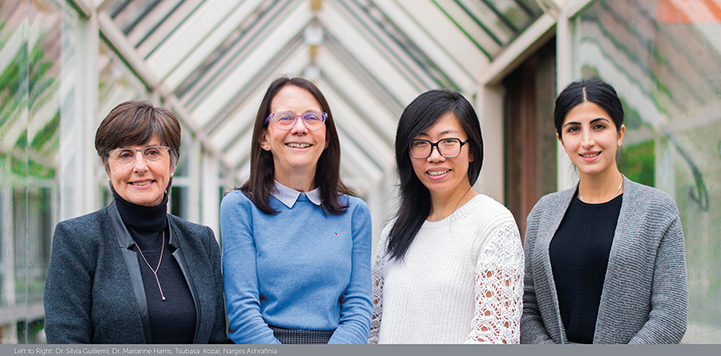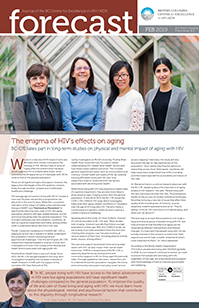
We are in a new era of HIV research and care. We have never known more about the virology of HIV. We also have an array of highly effective antiretroviral therapies which suppress HIV to undetectable levels, while extending the life expectancy of individuals with HIV to close to that of the general population.
These are all significant signs of progress; however, the legacy from the height of the HIV epidemic remains today through another complex and multifaceted healthcare challenge.
The average age of a person living with HIV in Canada is now over 50 years old and this is projected to rise above 65 in the next 10 years. While this is a positive indication of the impact of highly active antiretroviral therapy (HAART) and Treatment as Prevention® in significantly reducing new cases of HIV, this aging population presents with age-related diseases sooner and more frequently than the general population. This includes cardiovascular and metabolic conditions, as well as cognitive impairment and frailty, among others. Little is understood about why this is the case.
The BC Centre for Excellence in HIV/AIDS (BC-CfE) is playing an active role in research to better understand this population’s distinct physiological and psychosocial challenges. Over the last 10 years, BC-CfE researchers have participated in a series of long-term investigations to look more closely at the lifestyle and health factors associated with aging with HIV.
Positive Brain Health Now is one such study. Since 2013, the BC-CfE has participated in this long-term investigation funded by the Canadian Institutes of Health Research (CIHR) with the support of the Canadian HIV Trials Network (CTN).
Led by investigators at McGill University, Positive Brain Health Now researchers are focused on better understanding HIV-related ‘brain health’ factors and how these impact patient outcomes. This includes general cognitive processes such as concentration and memory, mental health and quality of life. By carefully tracking 856 adults living with HIV over time, researchers hope to understand the risk factors associated with declining brain health.
While those living with HIV may experience higher rates of cognitive impairment, they are also more likely to show physical signs of aging sooner than the general population. In the fall of 2019, the BC-CfE joined the CIHR-CTN CHANGE HIV study which investigates frailty and other aging-related conditions in Canadians over the age of 65 living with HIV. The term frailty is commonplace in geriatric medicine and is used as a marker of physical wellbeing.
Speaking about this study, Dr. Silvia Guillemi, Director of Clinical Education at BC-CfE said, “Many studies look at aging, however typically they follow younger populations as they age. With the CHANGE study, we are looking at an older population from the start and charting their progress over five years looking at various aspects of their lives, including physical activity levels, trauma, among others.”
The care and support received at home among older adults with HIV can also impact their overall health outcomes. THRIVE, a study based at the BC-CfE, is exploring experiences accessing home and community supports in BC for those aged 50 years and older. Through qualitative interviews, researchers aim to understand how this population navigates the home and community care system and using novel “service access mapping” interviews, this study will also document the day-to-day experiences of this population – from where they fill prescriptions to where they access food. Participants’ narratives will help researchers understand how shifts in funding priorities have impacted the accessibility and nature of this care.
Dr. Marianne Harris is a clinical research physician with the BC-CfE. Speaking about the importance of aging studies in HIV research, she said, “People living with HIV are now living into their 50s, 60s, 70s and beyond thanks to the success of modern antiretroviral therapy. Now they’re facing a new set of issues that affect their quality of life including loss of memory, muscle weakness, breathing problems and so on. They’re asking, ‘Is this an HIV outcome or is it natural aging, and what can I do about it?’
“The best way to answer these questions is to study a large and diverse group of people living with HIV over time and look at how the effects of aging can be impacted by different interventions and lifestyle changes. It’s important that people living with HIV are actively involved in this research to share their lived experiences and to help us better understand what’s most important to them,” Dr. Harris explained.
According to the World Health Organization 37.9 million people were living with HIV/AIDS globally in 2018. As cure research continues to evolve, we need to ensure that people who are living with HIV, regardless of their age, are empowered and equipped with the knowledge of how to maintain good health and wellbeing.

